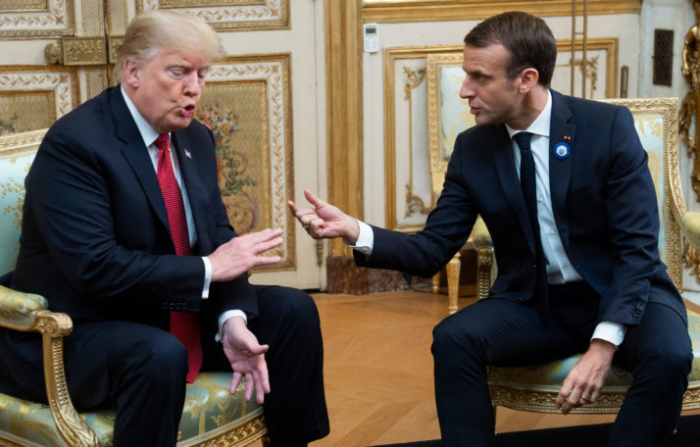Note d’actualité
La querelle d’un bluffeur et d’un bouffon autour d’une idée loufoque. On pourrait caricaturer ainsi la polémique qui s’est déroulée, à coups d’interviews et de tweets, entre les présidents français et américains après que le premier a évoqué le fumeux concept d’une soi-disant armée européenne. Difficile de dire ce qui a pu passer par la tête du chef de l’Etat, sachant que s’il y a un pays pour lequel la mise en commun des forces européennes signifierait une perte nette, pour ne pas dire désastre fatal, c’est bien la France. Sans doute en est-il conscient, auquel cas il a dû trouver que le plus grand mérite de ce concept est justement qu’il n’a aucune chance. Et qu’il irrite, au passage, le président Trump.
Au prime abord, les deux sont dans leurs rôles. Quoi de plus normal qu’un président français qui déclare vouloir une Europe militairement puissante et indépendante, et un président américain qui s’y oppose ? Le spectacle n’a rien de nouveau. C’est même l’axe principal des relations Europe/OTAN/Etats-Unis depuis toujours. Sauf que, jusqu’ici, les dirigeants français prônant inlassablement l’Europe de la défense avaient écarté l’idée même d’une armée européenne. De l’autre côté, dans leur refus systématique des velléités d’indépendance français, les dirigeants US s’étaient jusqu’ici abstenus de se moquer de l’occupation allemande, ou d’y mêler taux de chômage, cote de popularité et commerce des vins.

(Crédit photo: Saul Loeb/AFP)
Emporté par sa propre fougue lyrique, Emmanuel Macron a donc parlé d’armée européenne comme un des futurs grands projets pour l’UE. Un terme qu'aucun de ses prédécesseurs n’eût employé, sauf pour rassurer que, justement, une telle armée n’était point l’objectif de l’Europe de la défense. Et pour cause. Une structure militaire véritablement supranationale subordonnerait la France, seul pays européen disposant de toute la gamme des capacités de défense, à une majorité pacifiste-atlantiste qui ne seraient que trop heureux de pouvoir enfin jeter aux orties sa doctrine d’indépendance. Depuis, le président tente de rectifier le tir. Il précise que son appel à une armée européenne est surtout censé mobiliser en faveur de l’autonomie stratégique. A ceci près que les deux sont, dans les faits, incompatibles.
Donald Trump, pour sa part, s’offusque quand il entend son homologue français parler d’autonomie. Il le fait à sa manière, fort inélégante, mais son rappel sur la primauté de l’OTAN est le même que ce que Washington avait sorti à chaque fois que les Européens semblaient vouloir un tant soit peu s’émanciper militairement. Il y a vingt ans, au moment du lancement de la politique de défense de l’UE, l’administration Clinton les avait déjà mis en garde que si cette initiative avait pour objectif d’acquérir une autonomie, alors l’OTAN pourrait « devenir une relique du passé ». Et cela a toujours marché. La plupart des pays européens ne voulaient surtout pas risquer la garantie de défense collective offerte par l’article 5 de l’Alliance. L’ironie, avec Trump, c’est qu’il avait totalement discrédité cette même garantie, à force de l’avoir maintes fois remise en cause publiquement.
Mais le paradoxe le plus frappant reste du côté des Européens. Jamais depuis la fin de la guerre froide l’alignement des planètes ne fut aussi favorable pour que, enfin, ils prennent en main leur propre destin. La prestation diplomatique du président Trump, que ce soit sur le climat, le commerce, la Russie ou l’Iran, est comme une démonstration 24/24 des inconvénients de leur dépendance. Le tout dans un contexte où la raison originelle de cette situation asymétrique, à savoir la garantie de défense US, avait été ébranlée par le président US lui-même, et où les opinions publiques européennes, déjà peu contentes, risquent d’être encore plus irritées au vu de l’impuissance collective, sur la scène internationale aussi, de leurs gouvernements.
Et pourtant, ceux-ci se refusent à l’évidence. Comme à chaque fois quand la logique géopolitique en faveur d’une émancipation de l’Europe devient pratiquement irrésistible, comme ce fut le cas après l’annonce du « pivot » américain vers l’Asie, la plupart des dirigeants européens optent pour la crispation atlantiste. Plus la perspective d’une reprise en main de leur autonomie paraît inévitable, plus ils paniquent et s’empressent pour lui faire des obstacles. Sauf en France, où Emmanuel Macron, comme tous ses prédécesseurs, essaie de provoquer, auprès de ses homologues de l’UE, une prise de conscience générale. D’où cette phrase qui sonne comme une alarme : « être allié ça n’est pas être le vassal ». Et surtout « pour ne pas être le vassal, on ne doit pas dépendre » des Etats-Unis. Pour cela, il faut aussi, précise-t-il, se donner les moyens de cette autonomie. Sauf que les partenaires européens ne se bousculent pas. Comme la chancelière Merkel, tous se réfugient derrière la formule « en complément de l’OTAN », ce qui, sur le point crucial de l’indépendance, équivaut à une fin de non-recevoir.
***
D’autres articles de l’auteur sur le même sujet :
Défense européenne : la nouvelle donne PSDC-OTAN
Les points de blocage lancinants de l’Europe de la défense
Pente glissante : la réatlantisation de l’Europe de la défense
Vers la démystification de la relation transatlantique





















